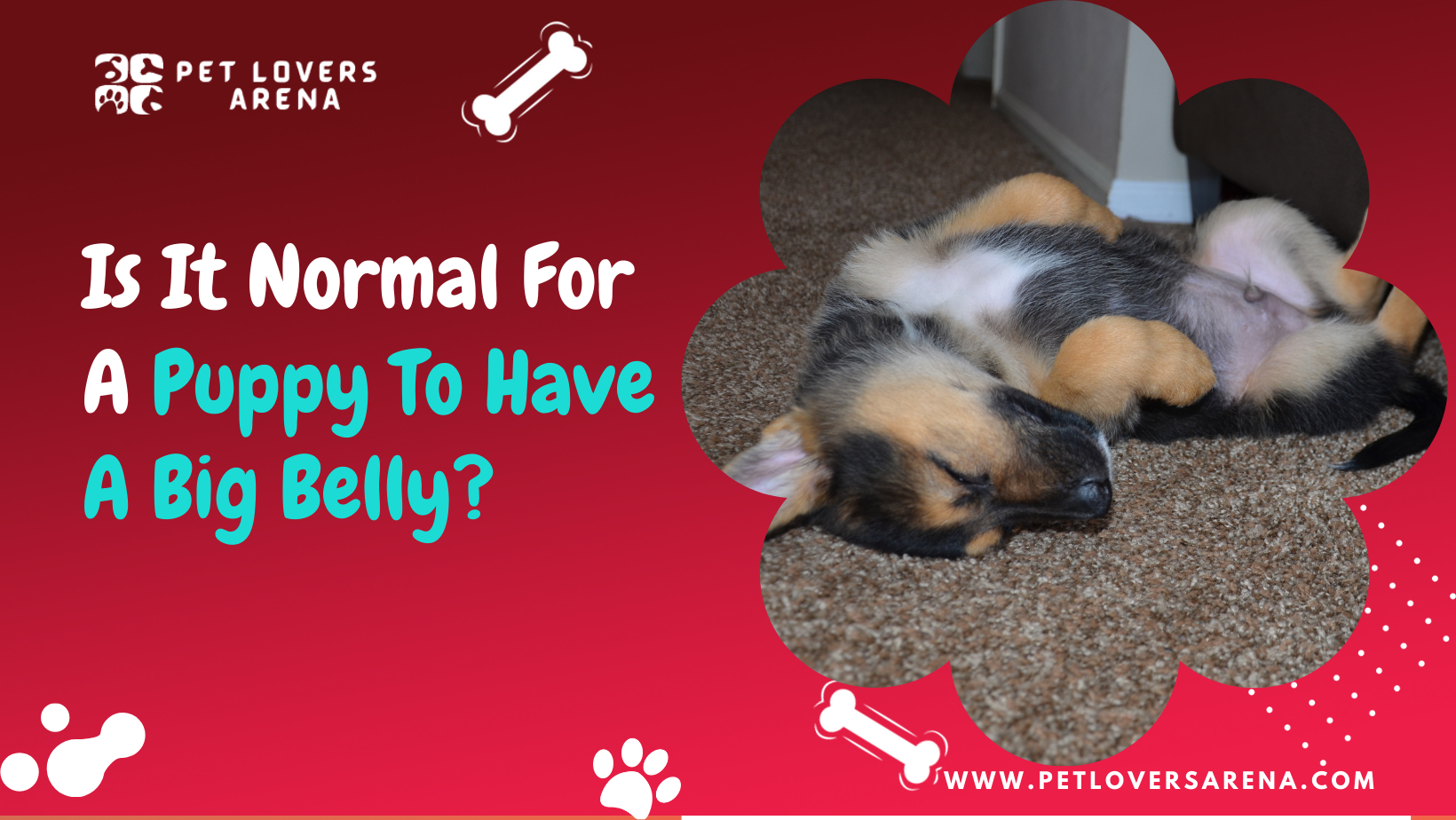Are you wondering the same as well for your puppy? There might be a number of reasons behind your puppy’s large tummy. There’s no need to be concerned if your dog’s stomach merely swells after drinking or eating and then goes down quickly.
Because your puppy’s body is so little, it’s natural for them to bloat a little after eating anything. There’s no need to be concerned as long as your puppy is thriving normally.
However, if your puppy’s stomach has bloated and is not deflating, or if your puppy is in discomfort, it might be suffering from a severe ailment that requires medical attention.
What Causes a Swollen Belly in Puppies?
Your dog’s belly might be bloated for many reasons, including obesity or pregnancy, but there are also other causes. The following are the causes:
1. Parasites
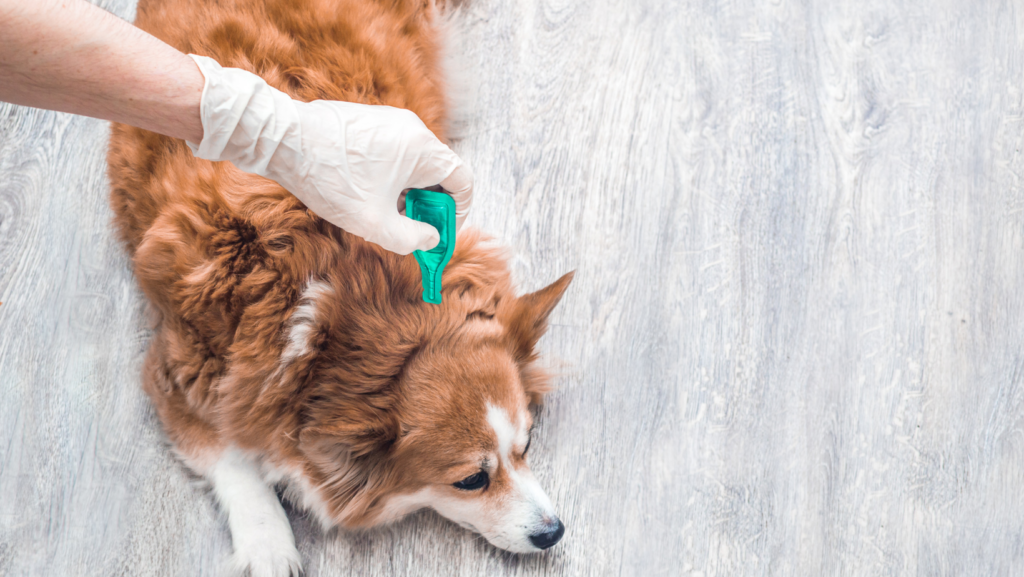
Most pups are born with worms in their intestines. The two most prevalent forms of worms discovered in pups are hookworms and roundworms.
If left untreated, parasitic worms can allow gas to build up in the intestines, resulting in a pot-bellied look. Having your pups examined for worms on a regular basis is a smart practice.
Your veterinarian can do a fecal test to see whether your dog has worms; however, these tests don’t always identify the presence of worms, especially if the problem isn’t severe.
Even if there hasn’t been a positive fecal test, physicians often advise you to deworm your puppy just to be safe. Deworming should be done in two, four, six, and eight weeks.
2. Bloating

This illness, popularly known as gastric dilatation and volvulus syndrome (GDV), affects older dogs more frequently. This life-threatening illness can, however, affect certain puppies. Large breeds are commonly affected.
In addition to a large tummy, your puppy may show signs of retching, ineffective vomiting, or attempts to go to the toilet, as well as a high heart rate, restlessness, and a refusal to lay down. Your pet may also whine incessantly or breathe irregularly.
It’s unknown what causes this disease, but if your dog undertakes a lot of intense exercises just after feeding, that might be one explanation. If you suspect bloat, you should consult a veterinarian right once to learn the best treatment options for your dog.
Allowing your puppy to eat too quickly can cause bloating and is among the most common feeding blunders.
Some experts advocate a higher food and water bowl for giant breed dogs. Sitting them up off the ground prevents them from swallowing air with their meal.
This air might twist your puppy’s stomach, locking food particles in the intestine. When bloating takes place, it can kill your puppy in a matter of hours. Underweight dogs are in much greater danger because they eat as quickly as they can.
3. Overfeeding
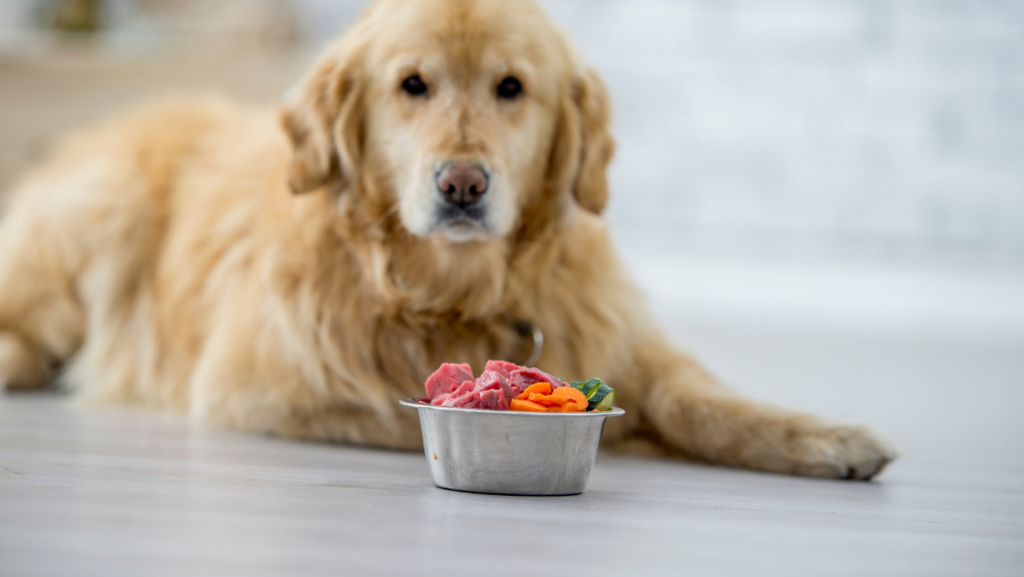
If you’re caring for a newborn puppy ( born prematurely or abandoned) and are bottle-feeding formula, you could notice that your puppy’s tummy is inflated.
Your dog may be gassy and have watery green or yellow feces in addition to a big stomach.
These signs indicate that you have been overfeeding your dog. To solve the problem, dilute your puppy’s formula by upping the amount of water by 25% for a few days.
Overfeeding can be avoided with this remedy, which can also aid in reversing diarrhea symptoms. It also aids in the prevention of dehydration in your dog.
4. Ascites

Fluid accumulation can cause a large belly. Ascites is a disorder that causes the belly to swell with fluid in certain pups. If fluid builds up in your puppy’s stomach, its belly may appear to be larger. Certain health conditions such as vomiting, drowsiness, stomach pain, breathing issues, digestive problems, etc., may develop in your puppy.
This accumulation might indicate a problem with one or more of your puppy’s internal organs, such as the heart or liver. Your vet may be able to identify a cardiac condition using a stethoscope.
Problems like intestinal hemorrhage or a burst bladder can also cause it. The goal of the procedure is to look for bacteria or bleeding in the abdominal fluid. Your veterinarian may, however, suggest that your pup should undergo further testing. These tests may include an x-ray or an ultrasound to determine the source of the problem. Draining the fluid, antibiotic treatments, and, in certain circumstances, surgery is used to address the condition once it has been identified.
5. Hernia
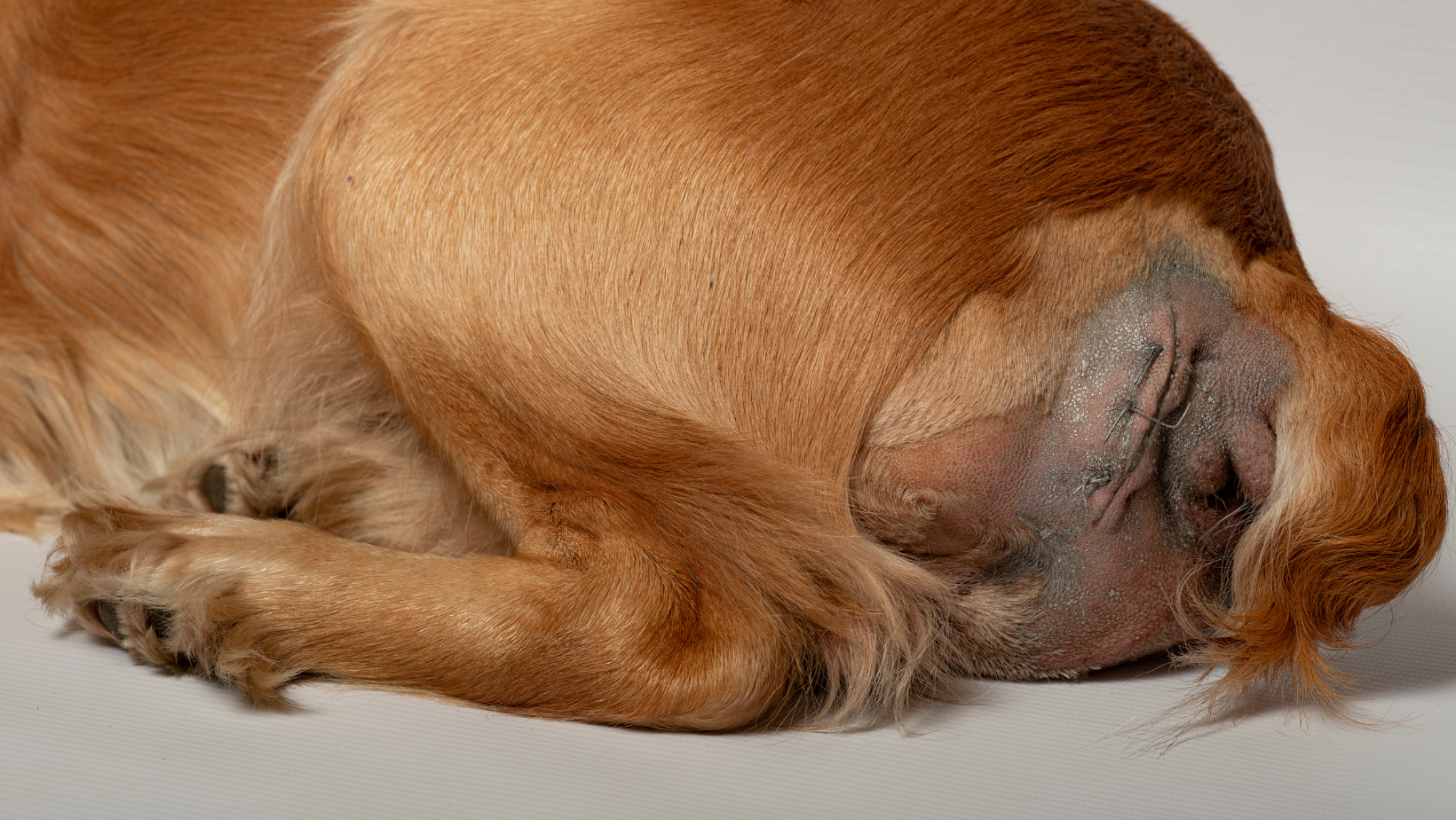
An internal hernia in your puppy might give an impression of a swollen tummy. An umbilical hernia occurs when the umbilical cord does not seal properly after delivery. You’ll observe swelling in the abdomen, just below the rib cage.
Umbilical hernias become more apparent when your puppy stretches, stands, or barks. These are usually mild enough that they won’t harm your puppy, and they’ll go away on their own as your puppy develops.
A bulging abdomen or digestive organs that have pressed through the stomach wall might possibly be the cause. It’s important to get your dog diagnosed by a veterinarian.
6. Hormonal Issues
Hormonal illnesses may affect dogs as well, with diabetes mellitus, hypothyroidism, and Cushing’s disease being the most common endocrine diseases in dogs.
Cushing’s disease, which is triggered by either cortisol (hormone) production or an adrenal gland tumor, is another reason your puppy’s tummy may appear bigger. This sickness is more common in middle-aged canines. Your puppy’s tummy will become firm and bloated.
Other signs and symptoms include lethargy, hair loss, overeating, and excessive drinking. Your veterinarian may begin treating this condition with drugs or, if necessary, surgery.
Also Read: Can A Puppy Leave Mother At 6 Weeks?
Tips on Treating a Puppy’s Big Belly
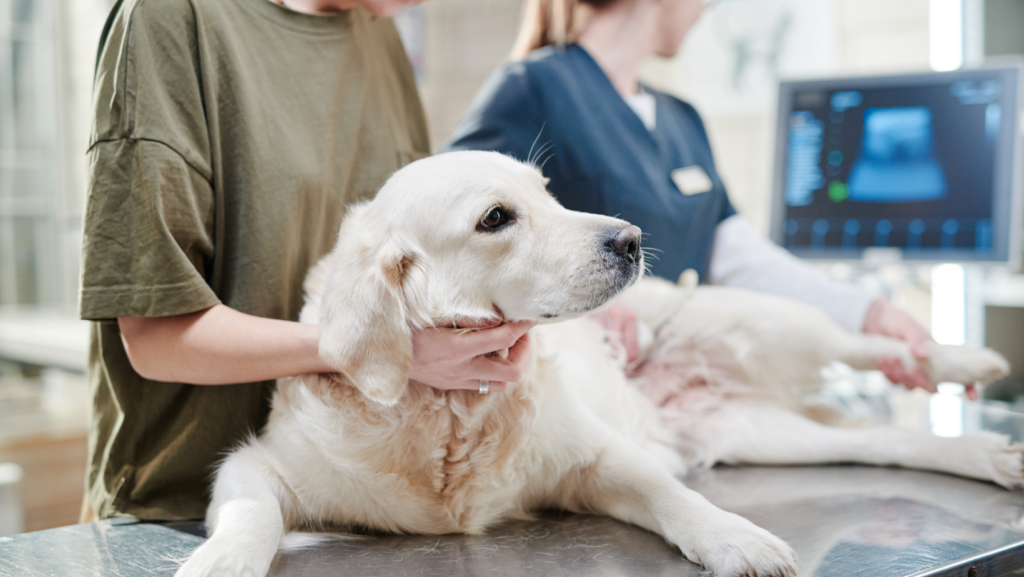
Getting worried about the swollen belly of your puppy is pretty obvious. So, here are some important tips on treating a puppy with a big belly as a preemptive measure.
1. Get A Stool Test Done
Even if a dog’s stomach is swollen, but he or she is acting normally, a vet should be consulted. This involves having their stool tested. This will help to streamline the process and provide a more accurate assessment of the puppy’s health.
2. Consult A Vet For A Proper Diagnosis
Parasites are likely to be present in a puppy with a swollen stomach. This indicates you should contact a veterinarian as soon as possible. If you wait too long, the parasites will have a greater influence on the puppy’s health and immune system. You don’t want the dog’s health to be jeopardized in its early years.
The best line of action is to get the puppy’s swollen stomach examined by a veterinarian and then proceed from there.
3. Deworm Your Puppy
Deworming pups is essential, and most dog owners are unaware of. You must ensure that the worms in a puppy’s stomach do not begin to endanger the puppy’s overall health.
You must remove the worms from a puppy’s body as quickly as possible. This is the only method to ensure that the puppy feels well and that the abdomen returns to its pre-parasite state.
4. Give Them a Strict Diet
Offering a strict diet is critical because eating incorrect foods is going to spread the parasites much further. It could also create a situation in which the symptoms worsen as a result of the dog’s diet containing aggravating items.
Ensure he has plenty of water throughout the day. The puppy will be happy and healthy.
Set a tight diet for the puppy. A big dog tummy is unsettling, but sticking to a healthy eating plan is always good.
You May Also Read: How To Potty Train A 6 Week Old Puppy
How to Check if Your Puppy Has a Normal Belly?
By now, you should have a good idea if it is normal for a puppy to have a big belly. Yes. After eating some food, it’s common for your puppy’s belly to bloat. However, it might be a different issue if they haven’t eaten.
You can keep track of things by checking your puppy’s belly on a frequent basis. Examining frequently can help you notice issues as soon as they emerge, which can be beneficial if the problem is one that requires treatment.
There should be no obvious lumps beneath your puppy’s tummy. But, it must be loose, allowing you to move it around when you touch it. A tight stomach might indicate a problem, such as parasites or bloat.
Do a visual examination to inspect lumps or tumors bulging from the skin. Rub your fingertips on your puppy’s stomach to check if lumps or knots are apparent or not, if it’s not visible from outside.
When you press on a typical puppy tummy, it will feel soft and give little resistance. It will have a spongy texture. It might be bloat or inflammation if you press on your puppy’s tummy and it feels hard.
You should also keep an eye for any indicators of pain or discomfort. You should take your puppy to the vet if he or she makes sounds or has problems breathing when you apply pressure. Swelling that occurs suddenly should always be taken seriously and should be treated by a veterinarian.
Takeaway
When it comes to your dog, a swollen belly is not something to ignore. It can be a sign of a serious underlying issue. While overeating might cause your dog’s stomach to swell, it’s more probable that your dog needs immediate medical assistance. Of course, there’s a difference between your dog gradually acquiring weight around their tummy due to overeating and a lack of activity and being genuinely bloated.
Meet Madison Phillips, your compassionate guide to pet well-being. With experience from VCA Animal Hospitals and Laxton Vet Clinics Bellaire Inc. Madison honed her skills and embraced the balance of medical expertise and compassion, through her articles, she simplifies pet care, whether you’re a newbie or an experienced pet parent.

